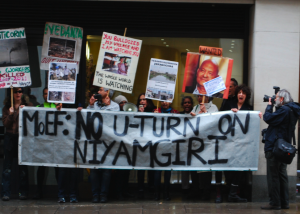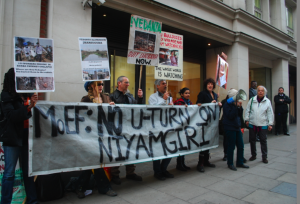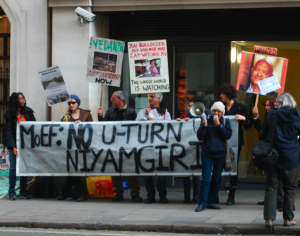 Indian Supreme Court judges today handed the final decision on Vedanta’s Niyamgiri mine to the Dongria Kond tribe and farmers living around the mountain. Two Gram Sabha’s (village councils) or local self-government within 10km of the proposed mine should announce their decision to the Ministry of Environment and Forests within three months1. The decision will have a major financial and reputational impact on Vedanta and may force them to close their Lanjigarh refinery, costing them billions.
Indian Supreme Court judges today handed the final decision on Vedanta’s Niyamgiri mine to the Dongria Kond tribe and farmers living around the mountain. Two Gram Sabha’s (village councils) or local self-government within 10km of the proposed mine should announce their decision to the Ministry of Environment and Forests within three months1. The decision will have a major financial and reputational impact on Vedanta and may force them to close their Lanjigarh refinery, costing them billions.
In London, activists from Foil Vedanta and other grassroots groups descended on Vedanta’s nominal Mayfair headquarters later today celebrating what they see as a victory for local self-determination, but calling for thorough independent oversight of the decision making process which they say is wide open to abuse by Vedanta officials and state police. They held a loud noise demonstration, and held a banner stating ‘MoEF: No u-turn on Niyamgiri’ while shouting slogans with a large megaphone. The protesters again called for Vedanta to be de-listed from the London Stock Exchange for poor corporate governance and human rights crimes.
See the video of today’s demo here, and another short clip here.
More photos on demotix here.
See video of celebrations on Niyamgiri mountain as the verdict was delivered and an interview with Kumuti Majhi here.
 Protesters in London today staged a loud protest at Vedanta’s headquarters in reaction to the Supreme Court’s judgement to leave the final decision on Niyamgiri to the people affected, which they see as a victory for self-determination and tribal rights. They again added their voice to demands by parliamentarians and financiers that Vedanta is de-listed from the London Stock Exchange for its poor corporate governance, illegal operations and major human rights violations such as those committed at Niyamgiri.(1)(2) In January Foil Vedanta handed documentation on a variety of abuses to the Financial Services Authority who are now investigating the company’s abuses and the case for de-listing2. In February David Cameron again used his India visit to pressure Indian PM Manmohan Singh to allow Vedanta’s Niyamgiri mine.
Protesters in London today staged a loud protest at Vedanta’s headquarters in reaction to the Supreme Court’s judgement to leave the final decision on Niyamgiri to the people affected, which they see as a victory for self-determination and tribal rights. They again added their voice to demands by parliamentarians and financiers that Vedanta is de-listed from the London Stock Exchange for its poor corporate governance, illegal operations and major human rights violations such as those committed at Niyamgiri.(1)(2) In January Foil Vedanta handed documentation on a variety of abuses to the Financial Services Authority who are now investigating the company’s abuses and the case for de-listing2. In February David Cameron again used his India visit to pressure Indian PM Manmohan Singh to allow Vedanta’s Niyamgiri mine.
Foil Vedanta’s Samarendra Das says:
“For ten years Vedanta has harassed local people and committed major abuses and illegalities in its attempt to push this flagship project through. For ten years farmers, Dalits and Adivasis living around Niyamgiri have fought to save their traditional communities and their sacred mountain, from a mine which would give just four and half years worth of bauxite for the 6 million ton per year refinery as planned by Vedanta Aluminium.
The Supreme Court is right that decision on the mine should be with those affected by it – the ancient inhabitants of the mountain. But the Dongria and others have stated their disagreement over and over again through Gram Sabha’s and mass rallies. We know that Vedanta officials have been very active in lobbying the judges leading up to this decision, and are concerned that the villagers will be under heavy harassment from Orissa state and Vedanta officials. We call for many independent observers to oversee this crucial process.
We demand that Vedanta is now de-listed from the London Stock Exchange in recognition of it’s proven abuses of law and Human Rights.”
 The judgement states that the decision making process at local councils will be overseen by a judge appointed by the Orissa High Court. Vedanta officials and police have been repeatedly accused of trying to force villagers not to oppose the project in the past. As Dongria Kond activist Lado Sikaka states:
The judgement states that the decision making process at local councils will be overseen by a judge appointed by the Orissa High Court. Vedanta officials and police have been repeatedly accused of trying to force villagers not to oppose the project in the past. As Dongria Kond activist Lado Sikaka states:
“We will continue our fight even if Vedanta gets permission. Are these Judges above the Law? In effect, they act as if they are. Niyamgiri belongs to us. We are fighting because We are part of it. Our women are harassed and we are called by the police and threatened not to go to rallies. Last month they have been working like Vedanta’s servants.3”
The ultimate decision will now rest with the Ministry of Environment and Forests who will accept the local council’s decision within three months(3). The Ministry banned the mine in 2010 after the N.C. Saxena committee warned that mining in Niyamgiri will severely affect the ecology and the habitat of the primitive Dongria Kondh tribe that lived on the mountain slopes. In February the Ministry again stated that they would not allow the Niyamgiri mine as Solicitor General Mohan Parasaran told the Supreme Court “We are completely against the mining operations.4“
Senior Counsel, Sanjay Parikh, who has fought the case for the Dongria Kond said today:
“The historic judgement delivered by the Supreme Court today recognises the community, cultural and religious rights of tribals. The Dongria Konds can now establish the abode of their Niyam Raja. The Supreme Court verdict is significant as it recognises the rights of tribals against mighty mutlinational corporations”.
Vedanta is currently at a shareholder confidence low, as Societe General downgraded their shares to BB- or ‘sell’ status several weeks ago and suggested that they are unlikely to get permission to mine Niyamgiri5, while Standard and Poor have also downgraded Vedanta’s shares to BB6. Societe General’s recent report states:
‘Niyamgiri bauxite reserves were central to Vedanta’s aggressive expansion plans in aluminum…Vedanta’s management was overly confident and committed too much capital without getting all the relevant clearances7.’
Vedanta are also in more trouble as a major acid gas leak earlier this month led to mass protests at Vedanta’s copper plant in Tamil Nadu, India, which have forced the plant to close until the National Green Tribunal has made a recommendation on whether it should be allowed to re-open at all. Their report is expected on 29th April8.
The Niyamgiri project has been racked with controversy from the start, as a spate of recent coverage points out: The Lanjigarh refinery built to process the bauxite from the hills was illegally constructed, the court case presided over by a judge with shares in the company, and the refinery should never have been given permission without including the associated mega mine in impact assessments9. A cover story in major Indian glossy Open Magazine in December details evidence of corruption and collusion between Vedanta and the Odisha state government, local officials, judges and the police to force the project through10.
See the video of today’s demo here, and another short clip here.
Press Coverage of our protest:
The Independent – Vedanta £1bn mine plan knocked back by India
Newz first – SC grants Gram Sabha power to decide the fate of Vedanta refinery
Demotix – Protest welcomes Court setback for Vedanta on Niyamgiri Mine – London
Press Coverage of the verdict:
The Hindu – Court directs gram sabhas to take a call on Vedanta’s mining project
Ends.
(1) British registered mining company Vedanta have been named the ‘world’s most hated company’ by the Independent newspaper for their long list of environmental and human rights crimes for which they are being opposed all over the world11. Most famously Vedanta’s plan to mine a mountain sacred to the Dongria Kondh tribe in Odisha, India, has led to mass protests and the Church of England among others pulling out investments.
(2)Most recently MP John McDonnell raised a debate in the House of Commons calling for the Financial Conduct Authority to use its powers to investigate and de-list companies guilty of major human rights violations such as Vedanta. Other parliamentarians, financiers and the former CBI Director Richard Lambert have also highlighted how Vedanta’s listing is used for legal immunity to hide their corporate crimes.
Vedanta was described in Parliament by Labour MP Lisa Nandy as ‘one of the companies that have been found guilty of gross violations of human rights’ . Ms Nandy in her speech quoted Richard Lambert the former Director General of the CBI: ‘It never occurred to those of us who helped to launch the FTSE 100 index 27 years ago that one day it would be providing a cloak of respectability and lots of passive investors for companies that challenge the canons of corporate governance such as Vedanta…’.12.
Similarly City of London researchers from ‘Trusted Sources’ have noted Vedanta’s
reasons for registering in London:
‘A London listing allows access to an enormous pool of capital. If you are in the FTSE Index, tracker funds have got to own you and others will follow. Both Vedanta Resources and Essar Energy are members of the FTSE 100. London’s reputation as a market with high standards of transparency and corporate governance is another draw for Indian companies. Both Vedanta and Essar have faced criticism on corporate governance grounds in India, and a foreign listing is seen as one way to signal to investors that the company does maintain high standards.’
In a parliamentary debate on 28th Nov 2012, MP John McDonnell made the case for Vedanta and other ethically contentious mining companies to be strongly regulated by the Financial Conduct Authority, including possibly de-listed ‘because of their begaviour in the developing world.’13
- According to today’s NDTV report:
The court has ordered the Odisha government to share details of the mining proposal with the gram sabha. The gram sabha has to make up its mind in three months and share its decision with the Environment Ministry.
The ministry had refused clearance for the Vedanta group’s massive bauxite mining project in the Niyamgiri Hills in August 2010. It withdrew clearance after the N.C. Saxena committee warned that mining in Niyamgiri will severely affect the ecology and the habitat of the primitive Dongria Kondh tribe that lived on the mountain slopes. The state-owned Odisha Mining Corporation, which has a joint venture with Sterlite, a Vedanta group company, had challenged the environment ministry’s withdrawal of clearance in the Supreme Court.
The Supreme Court had in 2008 given permission to Sterlite India for the diversion of 660 hectares of forest land in the Niyamgiri Hills for mining bauxite.
The Centre also withdrew earlier permission given to Vedanta to expand its 1 million tonne alumina refinery to 6 million tonnes at the Lanjigarh block of Kalahandi, also in Odisha.
Vedanta shut down its Lanjigarh alumina refinery on December 5 last year, citing shortage of bauxite. According to their agreement, Odisha Mining Corporation was supposed to supply up to 150 million tonne of bauxite for the Lanjigarh Refinery from bauxite mined in the Niyamgiri Hills, but was unable to do that because of the ban.
Vedanta has claimed that in the last five years of curtailed operation, the company has lost about Rs. 2,500 crore on an investment of Rs. 5,000 crore at the Lanjigarh plant.14
1http://www.thehindubusinessline.com/news/odisha-gram-sabhas-to-submit-report-on-bauxite-mining-issues-in-3-months-sc/article4629534.ece
3Excerpt from footage at http://www.youtube.com/watch?v=V3FZX5DrccU&feature=player_embedded
4http://india.nydailynews.com/business/ef9424cffff92d636d0e27b99c9f7003/centre-completely-against-mining-in-niyamgiri
5Vedanta Resources falls on bearish Societe General note. http://www.telegraph.co.uk/finance/markets/marketreport/9953367/Vedanta-Resources-falls-on-bearish-Societe-Generale-note.html
6http://www.business-standard.com/article/companies/vedanta-plc-gets-bb-ratings-from-s-p-faces-risks-of-further-downgrade-113040400428_1.html
7http://www.businessweek.com/news/2013-04-17/billionaire-agarwal-to-restart-mothballed-plant-corporate-india
8Decision on Sterlite after Green Tribunal’s Verdict. http://www.livemint.com/Industry/R57NhVrHLTFeKVFQfuquXI/Decision-on-Sterlite-after-green-tribunals-verdict-TN-gove.html
9‘Games Vedanta Plays’. Economic and Political Weekly.December 22, 2012. http://www.epw.in/editorials/games-vedanta-plays.html
10Mihir Srivastava. ‘How Big Business Gets Its Way: Companies like Vedanta are brazenly taking over governance in some parts of India’. Open Magazine. 22nd Dec 2012. http://www.openthemagazine.com/article/nation/how-big-business-gets-its-way